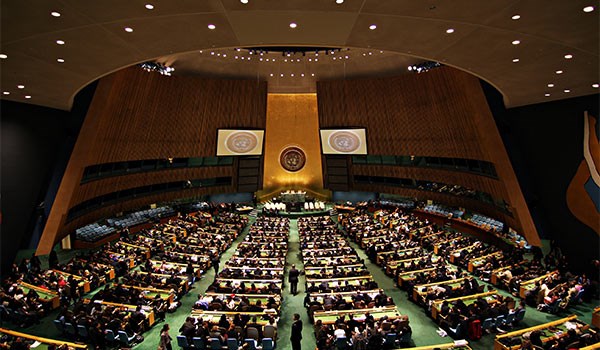
RNA - Tehran notes that some backers of the resolution were themselves among major and “discredited” violators of human rights and supporters of terrorism.
This came after the Third Committee of the UN General Assembly on Tuesday adopted a Canada-drafted resolution (itself accused of violating First Nation rights) accusing Iran of human rights violations and putting restrictions on freedom of expression.
On that note:
- Criticism of the UN has encompassed numerous arguments regarding various aspects of the organization, such as policy, ideology, equality of representation, administration, ability to enforce rulings, and ideological bias.
- Regarding the Human Rights Council’s membership, some members of the Council do not represent the shining stars of the human rights universe. In particular, the continued election of states like the US and Saudi Arabia is a sad testament to the General Assembly’s willingness to prioritize politics over principles.
- Other states which are at odds with the US and Israel have either failed in their campaigns to win a seat or have withdrawn in the face of heavy opposition - countries such as Syria where the US and Saudi Arabia have waged a regime-change war.
- The problem with the membership process is two-fold. First, too often the regional slate is not competitive, giving states little to no choice when electing members. Second, some member states avoid running for a seat for lack of resources or to avoid the difficult tradeoffs involved in casting votes for or against a particular state’s human rights record. Rich countries like Saudi Arabia and Canada too often have a seat. They sit on the fence when it comes to criticizing rivals like Iran. Building cross-regional coalitions of like-minded states, can and does make a difference.
- States could organize a formal pledging conference at which candidates must make specific commitments to uphold the highest standards in protecting human rights. The Office of the High Commissioner for Human Rights could issue an annual report on if and how each candidate has fully cooperated with the Council’s mechanisms. This report would include whether a state accepts country visits by Special Procedures and responds to their communications, submits timely reports to treaty bodies, and implements recommendations from the Universal Periodic Review (UPR). No biased and politically-motivated reports here.
Regarding country-specific scrutiny by the Council, such as the latest anti-Iran report, there is an impression that the body spends too much time passing politicized resolutions and not enough time on the hard cases of systematic violations in specific countries. If we consider all the relevant mechanisms of the Council, including country visits and reports by independent experts, special sessions, commissions of inquiry and the new Universal Periodic Review, we discover a much higher level of inattention and inaction towards Israel and the Palestinian issue.
This is having the negative effect of expanding universality of human rights norms, reducing polarization at the Council, and opening the door to negative actors participating either directly in the UPR process or through country reports.
Finally, resolutions are some of the most important tools the UN has to investigate and pressure states like Saudi Arabia and Israel to clean up their acts on everything from torture and wars to freedom of expression, arbitrary detentions and religious freedom.
The world body should allow other credible stakeholders a voice in triggering examination of country situations as well, particularly those that demand urgent attention in Saudi Arabia, and request Council action on the Palestinian crisis.
A final word: Preserving and expanding the role of human rights defenders in Geneva was one of the priority objectives many of member states including Iran shared during establishment of the Council more than ten years ago. Unfortunately, however, several problems remain. NGO representatives invited to speak at the Council are routinely interrupted with harassing points of order from repressive lobbies and delegations. Reprisals against advocates who cooperate with Council mechanisms are much too frequent as well; a state’s failure to stop reprisals or use its money and influence to pressure others to vote against a rival state should disqualify it from sitting on the Council.
847/940